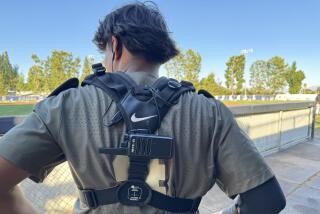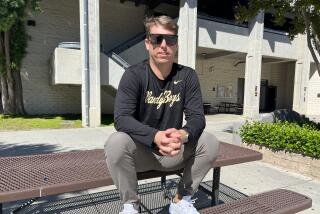One coach’s view: It’s time to play ball. Here’s why
- Share via
After a 10-month halt to high school sports competition in California because of the COVID-19 pandemic, Joshua Lee, a second-year baseball coach at North Torrance, has put together a first-person account of key issues politicians, superintendents and community leaders should consider in determining whether to resume activities.
Lee, 30, grew up in Orange County, has taught advanced placement history at a charter school in Watts, coached at Santa Ana Mater Dei, worked with club players and spent more than a year training and coaching North Torrance players from a variety of backgrounds.
With rallies organized by parents and students scheduled for 4 p.m. Friday at various high schools around the state to remind politicians that time is running out to resume sports competitions, Lee brings forth observations and perspectives that need to be addressed.
Among Lee’s points:
• Concerns over community spread of the coronavirus are unfounded:
“The idea that shutting down youth sports in schools is preventing community spread is not borne out by the facts nor any semblance of logic.
“For baseball, over 70% of my players have traveled out of state multiple times during this pandemic to play in tournaments. While I try to discourage it to a reasonable degree, these kids are being pushed to go out of state to show college and pro scouts any progress they’ve made and their worth on the field. I’ve had players travel to Arizona, Florida, Georgia, Tennessee, Alabama, Mississippi, South Carolina and North Carolina. All of these states are far less restrictive than California and have far fewer safety measures in place to prevent the spread of COVID.
“The idea that these teenagers, upon returning from out of state, are not going to see their friends, girlfriends, go to the store, is a fantasy that those of us who teach and coach teenagers know is unrealistic despite whatever our best efforts may be. So that begs the binary question — if a fairly large percentage of players are going to play either way — do we want them playing out of state in less safety-focused areas and returning back to our local communities, or would it be better to keep it in-house where we have measures and practices in place to keep it as safe as possible?”
• There are rising inequity issues:
“Only those with the means to travel to expensive out-of-state tournaments are able to. Once it’s established that high school athletes and their families, no matter the level of risk involved, are going to play wherever they can, it leaves an all too common trend — the difference between those whose families have and those whose families have not.
“Many of my lower income families, mostly minority families, have lost out on playing time, exposure, live reps, psychological benefits of athletics, camaraderie and competition. How can we as a state or community claim to want to help lift up those who are less fortunate when we are going along with a system that clearly incentivizes those with the means to do whatever they wish? This is not the creed that public schools or public school sports is supposed to be promoting.
• Mental health issues are real:
“As a teacher and a coach, every season you end up with students confiding in you struggles they are going through. But what we are hearing from our players and the numbers of those who are suffering has astronomically skyrocketed. Many of my players are seeking mental health services to deal with issues they are going through. The fact that [this is] necessary for so many student-athletes evokes such a sadness that it’s hard to describe with words.
“This doesn’t even touch on how devastating it is to look in these kids’ eyes and continually announce setbacks, with each time seeing a little bit more hope dwindle. I’ve always been optimistic with them about the situation and having a season, but looking seniors in the eyes — after having their junior years canceled as well — and know they feel hopeless and helpless to be able to once again play the sport they love before they are out of high school is just terrible. I fear the day our hearts truly break and we have to tell them this is the path while knowing it doesn’t have to be this way. If we accept the reality that sports are played in other states and our athletes will travel to find those games, why wouldn’t our government and communities want it to happen in a safe environment with trained professionals rather than out of state in areas and with people who often don’t even believe this pandemic is real — thus putting the very same people’s lives we are trying to protect at even higher risk.”
More to Read
Get our high school sports newsletter
Prep Rally is devoted to the SoCal high school sports experience, bringing you scores, stories and a behind-the-scenes look at what makes prep sports so popular.
You may occasionally receive promotional content from the Los Angeles Times.







